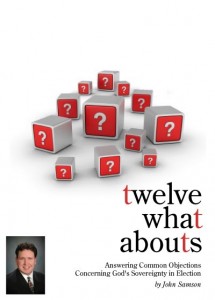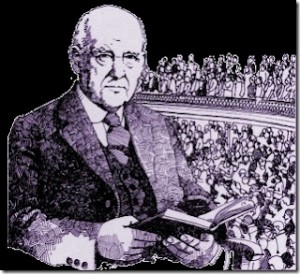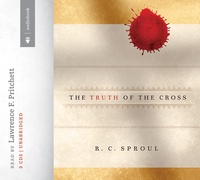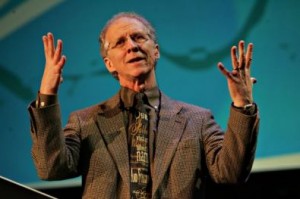 Let’s look at the words of Jesus in John chapter 6:
Let’s look at the words of Jesus in John chapter 6:
John Chapter 6:
34 Then they said to Him, “Lord, always give us this bread.”
35 Jesus said to them, “I am the bread of life; he who comes to Me will not hunger, and he who believes in Me will never thirst.
36 “But I said to you that you have seen Me, and yet do not believe.
37 “All that the Father gives Me will come to Me, and the one who comes to Me I will certainly not cast out.
38 “For I have come down from heaven, not to do My own will, but the will of Him who sent Me.
39 “This is the will of Him who sent Me, that of all that He has given Me I lose nothing, but raise it up on the last day.”
In this passage of Scripture, Jesus presents the big picture perspective regarding salvation. His words are altogether clear and unmistakable, as He portrays the complete sovereignty of God in salvation. The crowd that was following Jesus “believed” in Him as a miracle worker and as the Messiah. John 6:14 states, “Therefore when the people saw the sign which He had performed, they said, “This is truly the Prophet who is to come into the world.”
However, Jesus makes it clear that this crowd did not possess true living faith – a faith that saves. They instead possessed a temporary “belief” or affection for Christ, but as the rest of the chapter shows, when Jesus finished preaching this latest message, most in the crowd were no longer following Him. John 6:66 says, “As a result of this (“this” meaning Jesus’ own words) many of His disciples withdrew and were not walking with Him anymore.”
This then is the context. Jesus is addressing this unbelieving crowd and seeks to explain to them why it is they do not believe. Lets allow Jesus to tell the redemption story from His perspective, in His own words.
Jesus starts by saying “But I said to you that you have seen Me, and yet do not believe.” If there was ever a claim to true faith, Jesus dismisses that idea out of hand, telling them that they did not in fact believe in Him, and He knew it. He then goes on:
“All that the Father gives Me will come to Me.”
Each word here is vitally important. As we meditate on these words, we should notice the order Jesus gives us. All that the Father gives to Jesus – every single one of them – will come to Jesus. It is not the coming to Jesus of a certain group of people that prompts God to then give them to the Son. No, according to Jesus, its the other way round. Firstly, the Father gives a group of people to the Son, who will then come to the Son. It is the Father’s giving that takes place before the people’s coming. Jesus teaches us, in verse 37, that there is never the possibility of a single person being given by the Father to the Son who will not come to the Son.
Why do only some come?
If we believe the words of the Master, we would have to say that the answer lies in the Father’s Sovereign choice. The Father does not draw every human being to the Son, and remember He is addressing the crowd that does not believe in Him. It would seem the necessary implication that the reason these people had not believed was because they were not part of the group that the Father had given to the Son. Why? Because Jesus is talking directly to them and telling them they did not believe, and here He is explaining why: All that the Father gives to the Son, come to the Son, and those in this crowd had not come to the Son in true faith.
According to Jesus in John 6:44, no one can come to the Son unless the Father draws them, and all those drawn in this way will be raised up to eternal life. Jesus confirms this in verse 65, saying that no one can come to Him unless it is given to them by the Father.
The Giving and the Coming
Jesus says that all that the Father gives to Him, will come to Him.
Of course, it is imperative that people come to Christ to be saved. But here Christ gives us the insight on why some come and others do not. It is the Father’s gracious act in giving people to the Son that will without question, mean that each of these will come to the Son.
As we move from verse 37 to verse 38, Jesus explains the security of the relationship possessed by those who come to Christ. He says that He will never cast them out. In the original language, the aorist subjunctive of strong denial is used, which makes it clear that it is absolutely impossible for Jesus to reject anyone who comes to Him. He will never do it! There is no one who genuinely comes to Christ who will ever be rejected by Christ.
Why is this the case? Jesus continues, “For I have come down from heaven, not to do My own will, but the will of Him who sent Me.
So, what exactly is the will of the Father? “That of all that He has given Me I lose nothing, but raise it up on the last day.”
Jesus’ words are both remarkable and plain. There is no possibility whatsoever that Christ will fail to perform all of His Father’s will. Such a thought is unthinkable. Christ is the obedient Son of His Father, and is also, as God, omnipotent in power, so that no opposition or force could stop Him from achieving His desired goals. There is simply no way at all that the Son will fail to fulfill the will of His Father. This being the case, we have Christ’s own testimony that all those given by the Father to the Son, will without fail come to the Son, and will never be cast out, but raised up at the last day to eternal life.
The Basis
The basis for all this is not found in us at all. Jesus makes this very clear. He gives us a God centered Gospel, and His declarations here leave us in the arms of a Father who chose a people for Himself, and gives them as a gift to the Son. These then will, in time, come to the Son. Our confidence is found in knowing that the Father’s will is that none of those given by Him to the Son be lost.
These clear words give us complete and assured security in the Father (He gives His elect to His Son as a gift) and security in the Son (He will never fail to do His Father’s will). God is the Redeemer. Man is the recipient of the gracious working of God. Man is the object of salvation, but it is God, and God alone who acts to save man. That is the basis of our confidence. Like Paul, we can say, “For I am confident of this very thing, that He who began a good work in you will perfect it until the day of Christ Jesus.” (Phil. 1:6)
How Can We Know If We’re Among The Elect?
Continue reading →

 But in every decision that we make that affects us together or affects our family, the responsibility to make the decision rests with me. If there is genuine male headship, I believe there is a quiet acknowledgement that the focus of the decision making process is the husband, not the wife. Even though there will often be much discussion and there should be mutual respect and consideration of each other, ultimately the responsibility to make the decision rests with the husband. And so, in our marriage the responsibility to make the decision rests with me.
But in every decision that we make that affects us together or affects our family, the responsibility to make the decision rests with me. If there is genuine male headship, I believe there is a quiet acknowledgement that the focus of the decision making process is the husband, not the wife. Even though there will often be much discussion and there should be mutual respect and consideration of each other, ultimately the responsibility to make the decision rests with the husband. And so, in our marriage the responsibility to make the decision rests with me. (1) There’s been something of a delay at the printers but the good news is that my new book “Twelve What Abouts” should start shipping out within the next week. It is 160 pages (longer than people thought it might be) in its paperback edition. You can order it at the pre-publication sale price at the link to the right.
(1) There’s been something of a delay at the printers but the good news is that my new book “Twelve What Abouts” should start shipping out within the next week. It is 160 pages (longer than people thought it might be) in its paperback edition. You can order it at the pre-publication sale price at the link to the right. (3) “What is needed is something that cannot be explained in human terms. What is needed is something that is so striking and so signal that it will arrest the attention of the whole world. That is revival.
(3) “What is needed is something that cannot be explained in human terms. What is needed is something that is so striking and so signal that it will arrest the attention of the whole world. That is revival. (4) Once again, Ligonier has some excellent deals on right now in this week’s $5 Friday sale. I particularly recommend the audio book of The Truth of the Cross by R.C. Sproul (perhaps think about getting more than one as they make great gifts for Easter) as well as the “Evangelism According to Jesus” 2008 National Conference series download.
(4) Once again, Ligonier has some excellent deals on right now in this week’s $5 Friday sale. I particularly recommend the audio book of The Truth of the Cross by R.C. Sproul (perhaps think about getting more than one as they make great gifts for Easter) as well as the “Evangelism According to Jesus” 2008 National Conference series download.  When speaking of the doctrine of Original Sin, theologians are not so much referring to the first sin of Adam which was carried out in the garden of Eden, but the disastrous effects of that sin in all of his progeny. Since the time of Adam, everyone is born into this world as a sinner. As David writes in Psalm 51, “Surely I was sinful at birth, sinful from the time my mother conceived me.” (v. 5)
When speaking of the doctrine of Original Sin, theologians are not so much referring to the first sin of Adam which was carried out in the garden of Eden, but the disastrous effects of that sin in all of his progeny. Since the time of Adam, everyone is born into this world as a sinner. As David writes in Psalm 51, “Surely I was sinful at birth, sinful from the time my mother conceived me.” (v. 5) The following is a short article by Dr. John Piper entitled, “Being Mocked: The Essence of Christ’s Work, Not Mohammed’s.”
The following is a short article by Dr. John Piper entitled, “Being Mocked: The Essence of Christ’s Work, Not Mohammed’s.” “As the salt flavors every drop in the Atlantic, so does sin affect every atom of our nature. It is so sadly there, so abundantly there, that if you cannot detect it, you are deceived.”
“As the salt flavors every drop in the Atlantic, so does sin affect every atom of our nature. It is so sadly there, so abundantly there, that if you cannot detect it, you are deceived.” Influential blogger Justin Taylor posted an article, quoting Chris Castaldo’s “Three Misnomers to Avoid” concerning what the Roman Catholic Church teaches concerning the Mass. Rather than bringing clarity, I believe the article is very unhelpful and confusing.
Influential blogger Justin Taylor posted an article, quoting Chris Castaldo’s “Three Misnomers to Avoid” concerning what the Roman Catholic Church teaches concerning the Mass. Rather than bringing clarity, I believe the article is very unhelpful and confusing. “Out of the anguish of his soul he shall see and be satisfied; by his knowledge shall the righteous one, my servant, make many to be accounted righteous, and he shall bear their iniquities.” – Isaiah 53:11
“Out of the anguish of his soul he shall see and be satisfied; by his knowledge shall the righteous one, my servant, make many to be accounted righteous, and he shall bear their iniquities.” – Isaiah 53:11 Let’s look at the words of Jesus in John chapter 6:
Let’s look at the words of Jesus in John chapter 6: